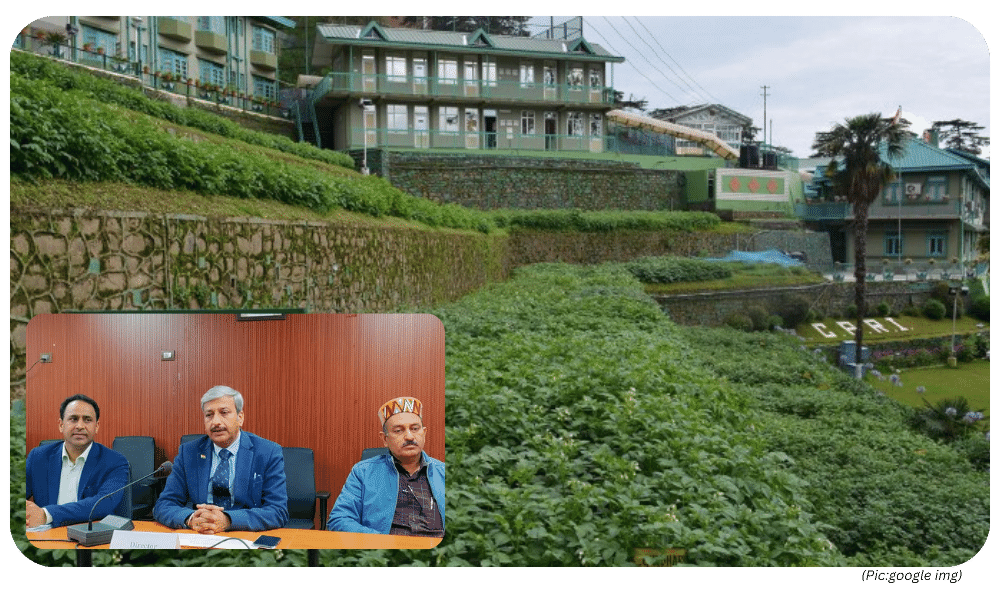Summary:
-
- Seed Potato Production Resumed: ICAR-CPRI Shimla has received permission to resume seed potato production in Kurfi and Fagu farms, providing relief to farmers.
- Cyst Nematode Issue: Production was halted due to cyst nematode detection; measures like home quarantine and sodium hypochlorite treatment have been implemented.
- Importance for Agriculture: Seed potatoes are crucial for high yields and farmer profitability; CPRI’s expertise ensures disease-free, high-quality seeds.
- Future Outlook: The resumption of production at CPRI is a positive step, with a focus on expanding capacity, farmer education, and ongoing research for sustainable agriculture.
What is the Himachal Current Affair?
-
- In a significant development for Indian agriculture, the Indian Council of Agricultural Research (ICAR)’s Central Potato Research Institute (CPRI) in Shimla has received permission to resume production of potato seeds in its Kurfi and Fagu farms.
-
- This long-awaited decision brings much-needed relief to farmers across the country, who rely heavily on high-quality seed potatoes for optimal yields.
The specific reason behind the suspension of seed potato production at CPRI farms:
Here’s an updated analysis incorporating this new detail:
Reason for Suspension:
-
- The editorial initially mentioned a long-awaited decision without specifying the reason. However, the information you shared clarifies that seed potato production was halted in 2018 due to the detection of cyst nematode in the CPRI farms located in Fagu and Kufri areas of Shimla district.
Cyst Nematode Threat:
-
- Cyst nematodes are microscopic plant-parasitic worms that can significantly damage potato crops by feeding on their roots. Their presence in seed potatoes poses a serious threat, as infected seeds can spread the infestation to new areas, causing substantial yield losses.
Home Quarantine and Resumption:
-
- The central government’s decision to impose a home quarantine on the affected area suggests a stringent approach to contain the spread of the cyst nematode. This likely involved restrictions on movement of tubers and agricultural activities to prevent further contamination.
Resumption and Implications:
The recent permission to resume seed potato production indicates that CPRI has successfully addressed the cyst nematode issue. This could involve:
-
- Elimination of infected potato stocks.
- Implementation of stricter quarantine and sanitation measures.
- Introduction of nematode-resistant potato varieties.
The resumption of production signifies a positive development for Indian agriculture. However, the incident highlights the importance of:
-
- Biosecurity Measures: Strict biosecurity protocols at CPRI farms are crucial to prevent future outbreaks of pests and diseases.
- Research and Development: Continued research on developing resistant potato varieties and effective management practices for nematodes is essential for long-term sustainability.
- By incorporating this new information, the editorial can be strengthened to provide a more comprehensive picture of the challenges and advancements related to seed potato production at CPRI farms.
What is the solution provided by ICAR-CPRI ?
ICAR-CPRI’s Solution:
-
- The specific solution implemented by ICAR-CPRI to address the cyst nematode problem. The article mentions a sodium hypochlorite (NaOCl) treatment for seed tubers. This involves soaking the tubers in a 2% NaOCl solution for 30 minutes, effectively disintegrating the cyst walls of the nematodes. This approach eliminates the nematodes present in the seed potatoes while ensuring minimal impact on the sprouting ability of the tubers.
Significance of the Solution:
The use of NaOCl treatment highlights a couple of key points:
-
- Effectiveness: This method offers a seemingly effective and efficient way to eliminate cyst nematodes from seed potatoes.
- Scalability: The simplicity of the NaOCl treatment suggests its potential for wider application within the CPRI farms and potentially by other potato seed producers.
A Multi-pronged Approach:
While the NaOCl treatment is a significant development, it likely represents just one aspect of ICAR-CPRI’s approach to address the cyst nematode issue. As mentioned earlier, the institute might have also implemented:
-
- Elimination of infected material
- Stricter quarantine and sanitation measures
- Introduction of resistant potato varieties
- Ongoing monitoring and testing
By combining these strategies, ICAR-CPRI can create a robust system to minimize the risk of future cyst nematode outbreaks and ensure the production of high-quality disease-free seed potatoes.
The Importance of Seed Potato Production:
-
- Potatoes are a vital crop in India, ranking second in global production. However, unlike some other crops, potatoes are not propagated by seeds but by tubers. These tubers, if not disease-free and of a superior quality, can lead to lower yields and higher susceptibility to pests and diseases. Seed potatoes, meticulously produced through a multi-stage process, ensure healthy plants, higher yields, and ultimately, greater profitability for farmers.
Challenges and the Path Forward:
-
- The suspension of seed potato production at CPRI farms in recent years posed a significant challenge for Indian agriculture. Farmers were forced to rely on alternative sources, which often lacked the quality and disease-free status of CPRI-produced seeds. This not only impacted yields but also potentially increased the spread of diseases, threatening overall potato production.
- The resumption of seed potato production at CPRI signifies a positive step forward. The institute, renowned for its expertise in potato research and development, has a proven track record of producing high-quality disease-free seed potatoes. With the resumption of production, farmers can once again access reliable seed sources, leading to:
-
- Improved Potato Yields: High-quality seed potatoes significantly contribute to increased crop yields, ensuring greater food security for the nation.
- Reduced Disease Outbreaks: Disease-free seed potatoes minimize the risk of outbreaks, protecting crops and reducing reliance on pesticides.
- Enhanced Farmer Income: Higher yields and reduced losses due to disease directly translate into higher income and improved livelihoods for potato farmers.
Looking Ahead:
The resumption of seed potato production at CPRI is a welcome step. However, ensuring long-term sustainability requires a multi-pronged approach:
-
- Increased Seed Production Capacity: Expanding seed production capacity beyond CPRI farms, potentially through public-private partnerships, is crucial to meet the nation’s growing demand for high-quality seed potatoes.
- Farmer Awareness Programs: Educating farmers about the importance of using certified seed potatoes and best practices for potato cultivation is essential to maximize the benefits of CPRI’s renewed production efforts.
- Research and Development: Continued research and development at CPRI, focusing on disease resistance and developing even higher-yielding potato varieties, will ensure long-term agricultural sustainability.
In conclusion, the ICAR-CPRI’s renewed seed potato production is a positive development for Indian agriculture. By ensuring access to high-quality seed potatoes, we empower farmers, enhance food security, and pave the way for a more prosperous and sustainable agricultural future.
About The Central Potato Research Institute (CPRI) in Shimla:
-
- The Central Potato Research Institute (CPRI) is a premier research institute located in Shimla, Himachal Pradesh, India. Established in 1949 under the Indian Council of Agricultural Research (ICAR), CPRI is the leading institute in India dedicated to potato research and development.
Focus and Activities:
Research: CPRI conducts basic, strategic, and applied research on various aspects of potato cultivation, including:
-
- Breeding new potato varieties with improved yield, disease resistance, and adaptability to diverse climatic conditions.
- Developing innovative techniques for potato production, storage, and processing.
- Studying potato diseases and pests and developing effective management strategies.
- Education and Training: CPRI offers various training programs for farmers, extension workers, and scientists on potato cultivation and management practices.
- Extension Services: The institute works with farmers and state agricultural departments to disseminate research findings and promote improved potato cultivation practices.
- Seed Production: CPRI plays a crucial role in producing high-quality disease-free seed potatoes, essential for ensuring healthy crops and maximizing yields. (This aspect was the focus of the previous editorials and discussions)
Significance of CPRI:
-
- Improved Potato Production: CPRI’s research has significantly contributed to increased potato production in India, making it the second-largest producer globally.
- Food Security: By promoting disease-resistant and high-yielding potato varieties, CPRI helps ensure food security for the nation.
- Sustainability: The institute’s research focuses on developing sustainable potato production practices that minimize environmental impact.
Livelihoods: CPRI’s work contributes to enhancing the income and livelihoods of potato farmers across India.
Additional Information:
-
- CPRI maintains a network of regional research stations across India, catering to the diverse agro-climatic conditions for potato cultivation.
The institute collaborates with national and international research organizations to share knowledge and develop better potato cultivation practices.
CPRI actively disseminates research findings through publications, workshops, and online resources.
- CPRI maintains a network of regional research stations across India, catering to the diverse agro-climatic conditions for potato cultivation.
QuizTime from Himachal News:
Mains Questions:

Question 1:
The recent permission granted to ICAR-CPRI to resume seed potato production signifies a positive development for Indian agriculture. Discuss the challenges associated with seed potato production and the potential impact of resuming production at CPRI farms.(250 words)
Model Answer:
Challenges associated with seed potato production:
-
- Disease and pest outbreaks: Seed potatoes need to be disease-free to ensure healthy crops. Cyst nematodes, as seen in this case, can significantly impact yields if present in seeds.
- Maintaining quality standards: Seed potatoes require specific growing conditions and meticulous handling to maintain quality and disease-free status.
- Limited production capacity: Demand for high-quality seed potatoes often exceeds existing production capacity, leading to reliance on alternative sources that might not meet quality standards.
Potential impact of resuming production at CPRI farms:
-
- Increased availability of high-quality seed potatoes: CPRI is known for its expertise in potato research and development. Resuming production ensures access to reliable and disease-free seeds for farmers.
- Improved potato yields: High-quality seed potatoes contribute to increased potato production, leading to greater food security.
- Reduced disease outbreaks: Disease-free seed potatoes minimize the risk of spreading diseases through infected tubers, promoting overall crop health.
Question 2:
The Recent solution provided by ICAR-CPRI mentions the use of sodium hypochlorite (NaOCl) treatment for seed potatoes to address the cyst nematode issue. Discuss the significance of this method and elaborate on other measures that can be taken to ensure sustainable seed potato production.(250 words)
Model Answer:
Significance of NaOCl treatment:
-
- Effectiveness: The NaOCl treatment offers a seemingly efficient way to eliminate cyst nematodes from seed potatoes while minimizing harm to the tubers’ sprouting ability.
- Scalability: The simplicity of the method suggests its potential for wider application within CPRI farms and potentially by other potato seed producers.
Other measures for sustainable seed potato production:
-
- Biosecurity measures: Strict protocols for quarantine, sanitation, and movement control within farms are crucial to prevent the introduction and spread of pests and diseases.
- Research and development: Developing potato varieties resistant to cyst nematodes and other common potato diseases contributes to long-term sustainability.
- Farmer education: Educating farmers about best practices for handling seed potatoes and identifying potential disease issues is essential to maximize the benefits of high-quality seeds.
By implementing a combination of these measures, ICAR-CPRI and other seed potato producers can ensure the production of disease-free seeds, leading to a more sustainable and productive potato farming sector in India.
Remember, these are just two examples of Himachal HPAS Mains questions inspired by the himachal current affair. Feel free to modify and adapt them further to fit your specific needs and writing style. Good luck with your preparation!
Relevance to the Himachal HPAS Prelims and Mains syllabus under the following topics:

Himachal HPAS Prelims:
-
- General Studies Paper I:
Agriculture: Broad issues in agriculture including production, processing and marketing with reference to Himachal Pradesh. (indirectly linked)
- General Studies Paper I:
Himachal HPAS Mains:
-
- Paper IV (General Studies-I):
Issues relating to agriculture and allied sectors. (indirectly linked)
Development processes and their impact on the environment. (indirectly linked)
- Paper IV (General Studies-I):











0 Comments